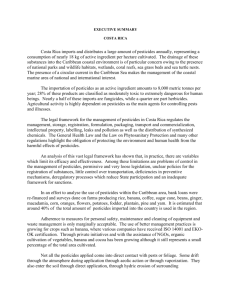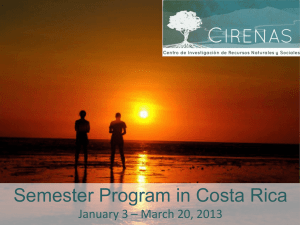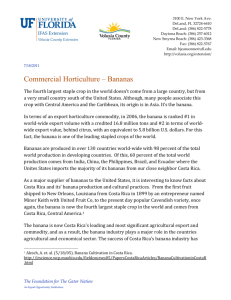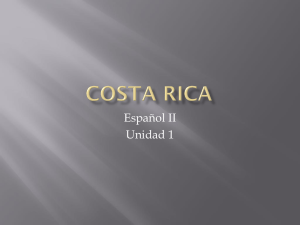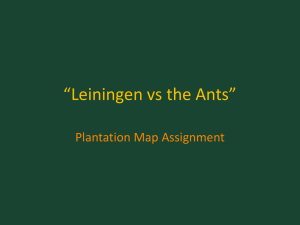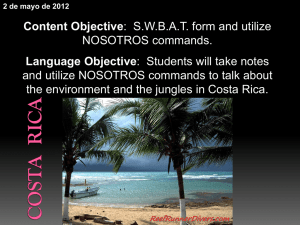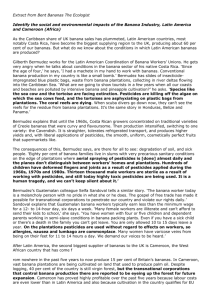Student Response W04 – Lauren Macnee
advertisement
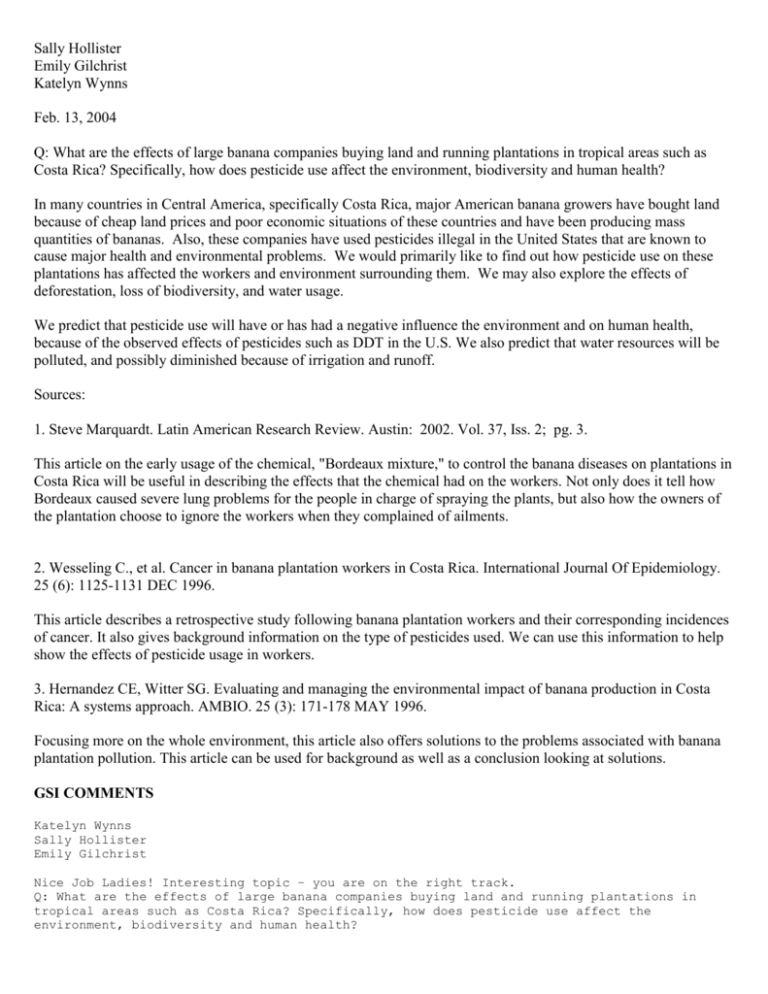
Sally Hollister Emily Gilchrist Katelyn Wynns Feb. 13, 2004 Q: What are the effects of large banana companies buying land and running plantations in tropical areas such as Costa Rica? Specifically, how does pesticide use affect the environment, biodiversity and human health? In many countries in Central America, specifically Costa Rica, major American banana growers have bought land because of cheap land prices and poor economic situations of these countries and have been producing mass quantities of bananas. Also, these companies have used pesticides illegal in the United States that are known to cause major health and environmental problems. We would primarily like to find out how pesticide use on these plantations has affected the workers and environment surrounding them. We may also explore the effects of deforestation, loss of biodiversity, and water usage. We predict that pesticide use will have or has had a negative influence the environment and on human health, because of the observed effects of pesticides such as DDT in the U.S. We also predict that water resources will be polluted, and possibly diminished because of irrigation and runoff. Sources: 1. Steve Marquardt. Latin American Research Review. Austin: 2002. Vol. 37, Iss. 2; pg. 3. This article on the early usage of the chemical, "Bordeaux mixture," to control the banana diseases on plantations in Costa Rica will be useful in describing the effects that the chemical had on the workers. Not only does it tell how Bordeaux caused severe lung problems for the people in charge of spraying the plants, but also how the owners of the plantation choose to ignore the workers when they complained of ailments. 2. Wesseling C., et al. Cancer in banana plantation workers in Costa Rica. International Journal Of Epidemiology. 25 (6): 1125-1131 DEC 1996. This article describes a retrospective study following banana plantation workers and their corresponding incidences of cancer. It also gives background information on the type of pesticides used. We can use this information to help show the effects of pesticide usage in workers. 3. Hernandez CE, Witter SG. Evaluating and managing the environmental impact of banana production in Costa Rica: A systems approach. AMBIO. 25 (3): 171-178 MAY 1996. Focusing more on the whole environment, this article also offers solutions to the problems associated with banana plantation pollution. This article can be used for background as well as a conclusion looking at solutions. GSI COMMENTS Katelyn Wynns Sally Hollister Emily Gilchrist Nice Job Ladies! Interesting topic – you are on the right track. Q: What are the effects of large banana companies buying land and running plantations in tropical areas such as Costa Rica? Specifically, how does pesticide use affect the environment, biodiversity and human health? In many countries in Central America, specifically Costa Rica, major American banana growers have bought land because of cheap land prices and poor economic situations of these countries and have been producing mass quantities of bananas. As a result, these companies have used pesticides illegal in the United States that are known to cause major health and environmental problems. We would primarily like to find out how pesticide use on these plantations has affected the workers and environment surrounding them. We may also explore the effects of deforestation, loss of biodiversity, and water usage. We predict that pesticide use will have or has had a negative influence the environment and on human health, because of the observed effects of pesticides such as DDT in the U.S. We also predict that water resources will be polluted, and possibly diminished because of irrigation and runoff. Sources: 1. Steve Marquardt. Latin American Research Review. Austin: 2002. Vol. 37, Iss. 2; pg. 3. This article on the early usage of the chemical, "Bordeaux mixture," to control the banana diseases on plantations in Costa Rica will be useful in describing the effects that the chemical had on the workers. Not only does it tell how Bordeaux caused severe lung problems for the people in charge of spraying the plants, but also how the owners of the plantation choose to ignore the workers when they complained of ailments. 2. Wesseling C., et al. (need all authors here) Cancer in banana plantation workers in Costa Rica. INTERNATIONAL JOURNAL OF EPIDEMIOLOGY 25 (6): 1125-1131 DEC 1996. This article describes a retrospective study following banana plantation workers and their corresponding incidences of cancer. It also gives background information on the type of pesticides used. We can use this information to help show the effects of pesticide usage in workers. 3. Hernandez CE, Witter SG. Evaluating and managing the environmental impact of banana production in Costa Rica: A systems approach. AMBIO. 25 (3): 171-178 MAY 1996. Focusing more on the whole environment, this article also offers solutions to the problems associated with banana plantation pollution. This article can be used for background as well as a conclusion looking at solutions.



